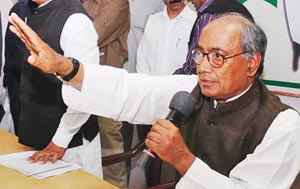New Delhi, June 6: Congress spokesperson Shashi Tharoor, who has come under fire from party leaders for praising Narendra Modi, today got a piece of advice from party general secretary Digvijay Singh "not to jump to conclusions".
"Modi Avtar 2? Let's not jump to conclusions but wait and watch," Digvijay Singh said on Twitter today.
The party had yesterday distanced itself from Tharoor's praise of Modi describing them as his "personal views".
Senior Congress leader Mani Shankar Aiyar had also slammed Tharoor calling him "immature" and a "chameleon".
Aiyar also said he was "deeply disappointed" that an "intelligent" man like Tharoor should want to rush to judgement in this manner and come out with this effusive remarks.
Tharoor, tweeted last night "I stand by every 1of my criticisms of @narendramodi in the past just as I appreciate his words in the present. Will watch his future actions."
In another tweet, he also said, "Indian liberals shd understand we can only win on the quality of our arguments,not the intensity of our anger. Our virtue isn't self-evident."
Earlier, in a US news website, Tharoor remarked that Modi was looking to turn himself from a "hate figure into an avatar of modernity and progress".
While addressing a press conference from the AICC podium on Wednesday, Tharoor said that the way Modi conducted himself after the election and spoke from the moment of his victory he "has been amazingly gracious and accommodative" of even those who had not voted for him.
"We should acknowledge that this may the evolution of Modi 2.0 but if Modi 1.0 reemerges, then we will robustly oppose him," he had said.
Yesterday, Tharoor while making it clear that he "cannot be called a fan of Modi" said that he was intrigued by the fact that the paraphrases of his piece that he has seen in the Indian media, showed that people don't actually read every word and every nuance.





Comments
Add new comment